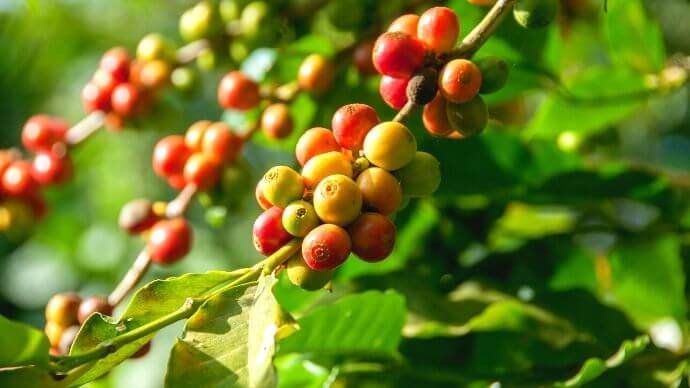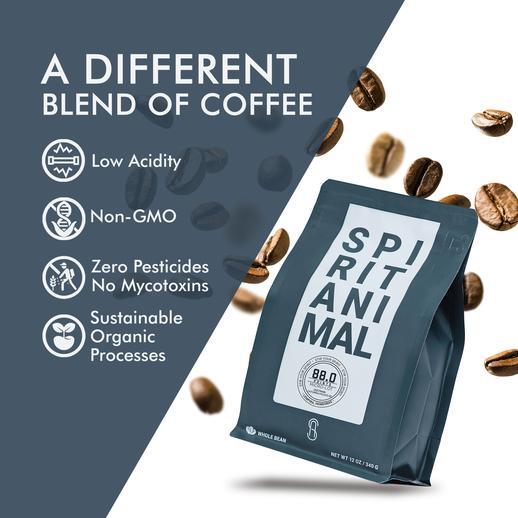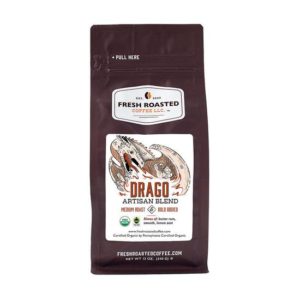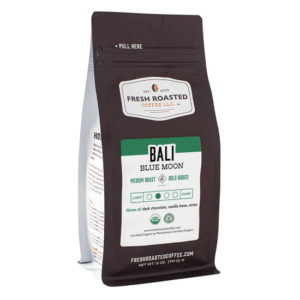We all want to drink better coffee. Coffee that tastes better, is better for your health, and the environment. But it’s not easy, since coffee crops are among some of the most chemically treated foods in the world!
Secure yourself a healthy beverage every morning with a simple little trick: switch to organic coffee!
Discover all you need to know about the best organic coffee beans: from organic coffee brands to clean coffee benefits!
[su_note note_color=”#fcf7e6″]When you buy a product via the links on IlCappuccinoExpress.com, I may earn a small affiliate commission at no extra cost to you.[/su_note]
[su_box title=”At A Glance: TOP PICKS FOR ORGANIC COFFEE BEANS” box_color=”#FF7777″ title_color=”#fcf5f6″ radius=”2″]
- BEST OVERALL: Spirit Animal Coffee
- BEST WHOLE BEAN: Volcanica Ethiopia Yirgacheffe
- BEST FOR PODS: FRC Organic Kona Island Blend
- BEST MUSHROOM COFFEE: MUD/WTR Coffee
- BEST DECAF: Volcanica Coffee Peru Organic [/su_box]
Contents
What’s the cleanest coffee?
TOP PICK 5/5 | Spirit Animal Coffee Spirit Animal Coffee currently produces the cleanest coffee you can find: organic, low-acid, free of pesticides, and grown at optimal conditions. You can choose from a few different varieties but all of their beans come from small farms in Honduras. They pay close attention to the coffee production process and the workers, making sure their practices are Fair Trade and sustainable. SAC coffee quite unique since they only source the top 1% beans from every harvest. All of their coffee is certified organic, fair trade, and fully sustainable. The beans are grown without any pesticides and they are tested for mycotoxins to ensure their highest quality. |
Are organic coffee beans better?
You don’t have to buy organic beans. But consider this: the coffee plant is one of the most pesticide sprayed crops in the world. If you care about your health, getting your hands on an organic product would make a lot of sense.
The popularity of organic coffee has been growing over the past years. After all, organic coffee is free of synthetic and chemical pesticides and fertilizers. Overall, it’s
- Healthier for you
- Better for the farmers
- More sustainable eco-friendly
But here’s the thing: organic coffee doesn’t have to be certified to be organic. Certifications are expensive and complex, which means that smaller coffee producers can’t always afford that.
In other words, many smallholder coffee farmers grow their coffee organically, they just don’t add the label organic on the package. The process of the official certification includes a lot of documentation since the term organic it’s not only “restricted” to the farmers, but to the roasters and even trucking companies.
Best Organic Coffee Beans
1. Spirit Animal Coffee Catuai &Bourbon – Best Overall
Key features:
- Light or medium roast
- Tasting notes: Tropical fruit, jasmine, hazelnut, chocolate
- Origin: single-origin from Honduras
- Low acid, sustainable
Even though they’re a new brand on the market, Spirit Animal doesn’t seem to lag behind in any way. Their selection of coffee is harvested and picked from micro-lots in Honduras. They have a sustainable coffee-producing process and Fair Trade practices.
Spirit animal Coffee sources only the top beans from each harvest, making their coffee available in limited releases only. If you’re looking for a healthy, low acid, and sustainable coffee, sign up for their subscription. That way you’ll never run out of the high-quality and unique brew.
2. FRC Ethiopian Sidamo – Best Organic Green Coffee
- Unroasted coffee
- Fair-trade certified
- Best for a light roast
- Tasting notes (if roasted properly): fruity, nutty, jasmine aroma, and citrus flavors
Sidamo is grown in Southern Ethiopia at a high altitude, between 1800 and 2000 meters above sea level. These beans were processed without any chemicals to maintain their overall quality and to bring the best into your home.
These beans have been fully washed, dried on raised beds. FCR has an entire range of unroasted coffee beans – the reviews claim to have the best organic green coffee beans.
FRC recommends roasting these beans between light to medium to keep the bright acidity of the coffee. Expect to discover fruitiness and hints of nuttiness in your cup, but jasmine aroma and citrus flavors when lightly roasted.
3. Volcanica Ethiopian Yirgacheffe Coffee – Best Whole Bean
- Medium/light roast
- Tasting notes: lemon, blueberry, blackberry
- Single-origin Arabica coffee
- Fairtrade certified, organically grown
Fresh and delicious, Ethiopia Yirgacheffe is Volcania’s top bestseller and with a good reason. The coffee is smooth, with just a perfect amount of caffeine that kickstarts your day. Beans will produce low acid coffee with a fruity tasting profile and an overall excellent complexity of flavors. Once you try this, you’ll understand why Ethiopian coffee is the very beginning of coffee!
4. Volcanica Coffee Peru Organic – Best Decaf
- Medium roast
- Tasting notes: lemongrass, plum, light nougat
- Single-origin Arabica coffee beans
- Organically grown, Swiss Water Processed
Did you know that Peru is the biggest producer of organic coffee? These decaf beans from Volcanica produce a complex cup of coffee with a full body and low acidity. It comes with a bright finish with smoky and floral overtones.
This coffee is also known as Tres Cumbres and it’s growing organically in the Andes region. It’s smooth and best enjoyed black since cream and sugar somewhat weaken its flavor.
5. FRC Organic Drago – Best for Espresso
- Fierce medium roast
- Tasting notes: butter rum, lemon zest, smooth finish
- Artisan coffee blend
FRC Organic Drago is an artisan blend of carefully selected beans from all over the world: Central America, Africa, and Indo-Pacific. The company prides itself in roasting these beans to perfection for the ultimate espresso experience with every cup.
This is a full-bodied coffee that’s smooth and perfectly powerful for espresso. I regularly use it in my Moka pot and a real espresso machine. Drago is a perfect coffee if you’re looking for a flavorful and full cup of coffee with a surprising freshness that makes a great cream.
It’s slightly milder than the classic Italian roast, which means it’s perfect for all, who believe the classic espresso is just too overwhelming for their tastebuds.
6. FRC Organic Bali Blue Moon – Best For Cold Brew
- Medium roast
- Tasting notes: syrupy dark chocolate, vanilla, and anise
- 100% Arabica beans from Bali
- Rainforest alliance, kosher, and organic certified
Choose from whole bean or ground coffee; Organic Bali from Fresh Roasted Coffee is a delicious treat for any type of brew, but it’s especially lovely in cold brew. The eathy notes are very subtle; instead, prepare for rich and syrupy chocolate notes and a creamy mouthfeel.
Pesticide and chemicals are illegal to use on coffee crops in Bali, which is also one of the reasons this coffee has been so sought after. Bali Blue Moon is one of FRC’s bestsellers and it’s easy to see why. F
resh Roasted Coffee gives back to the coffee growers and farmers, while the company claims to use the eco-friendliest roasting technology, eliminating carbon emissions up to 80%.
7. Peet’s Organic French Roast – Best for French press
- Dark roast
- Tasting notes: dark chocolate, smoke, burnt sugar
- Sealed for freshness
- Whole bean and ground available
This is a timeless and classic French roast that’s reliable, fragrant, bold, and smooth. If full-bodied brew is your thing, you’ll easily enjoy it. Peet’s French Roast is a signature blend of coffee beans with a Latin American origin: Guatemala and Colombia. In these places, the coffee cherries mature slowly, which results in a more exquisite taste. Medium body and low brightness.
8. Volcanica Sumatra Mandheling Reserve – Best Low-Acid
- Dark roast
- Tasting notes: brown sugar, dried fruits
- Organically grown, Fair Trade certified
- Whole beans and ground coffee available
Just like the other Volicanica coffee beans on the list, Sumatra is another 100% Arabica and high-quality coffee that will easily spoil your tastebuds.
Mahdheling is a smooth low acidic coffee with a heavy body and exotic flavor, coming to you all the way from Indonesia. The beans are carefully selected from smallholder farms to produce coffee that’s rich, dark, and naturally lower in acidity.
9. MUD/WTR Coffee – Best Mushroom Coffee
- Healthy alternative to coffee
- Organic adaptogenic mushroom blend
- Minimal caffeine content
- Immune system support + clear focus
MUD is not your typical coffee. It’s an organic blend of earth-grown ingredients that are a perfect coffee alternative for anyone who’s looking for a clean energy boost without the caffeine side effects – jitters, crashes, upset stomach.
MUD mushroom coffee combines a blend of masala chai, cacao, and four different mushrooms for an earthy flavor with hints of chocolate and spice. Minimal caffeine for complete immune system support and a healthy energy boost. In other words, it’s the best organic coffee with mushrooms.
10. FRC Organic Kona Island Blend – Best Organic Coffee Pods
- Medium roast
- Tasting notes: honeysuckle, sugar cane, berry
- Recyclable coffee pods certified organic
- Compatible with Keurig
Fresh Roasted Coffee Company prides itself in offering compostable and recyclable K-cups, which is a massive relief for the planet. Kona organic coffee is an artisan blend, medium roasted to perfection to ensure a smooth, delicious, and rich experience with every cup. The pods are compatible with most Keurig machines and produce lighter coffee – a true sunshine in a cup.
11. Death Wish Coffee – The Strongest Organic Brew
- Arabica and Robusta bean combo
- Dark roast
- Powerful organic blend
Death Wish is the strongest coffee in the world and it’s also organic. Their beans comply with USDA certification standards. But what’s pleasantly surprising is that this coffee is actually low in acidity and not as bitter as other super strong brews.
Since it’s a blend of Arabica and Robusta coffee beans, it’s smooth (thanks to Arabica) but high in caffeine (thanks to Robusta).
Apart from ground coffee for drip machines, the brand also offers K-cup options. So no matter what’s your preferred style of brewing, you’ll start your day with a bang! According to online reviews, you may start hearing smells and seeing sounds. Don’t say you haven’t been warned! (PS: avoid if you have a heart condition or simply can’t handle strong-ass coffee).
Organic Coffee Beans: What Does It Mean?
Let’s get one thing clear: organic doesn’t mean free of pesticides and fertilizers. In order for the crop to grow and be healthy, both of these are needed, but there’s a difference between natural and synthetic fertilizers.
There are different standards to organic labels and not all are the same. Heck, they differ from one country to another so what’s considered UDSA organic may have different standards to certified organic in Europe or Japan!
Organic Standards
- Growing: even for the certification label, the farmers still use fertilizers to produce healthy plants but they stick to natural options instead of synthetic ones (think coffee pulp, compost, or chicken manure)
- Processing: coffee is either wet or dry processed. No matter if the producers have the organic label or not, they have to ensure that the beans don’t get contaminated. In any case, dry processing is the simplest way and comes with lesser environmental impact than wet processing
- Roasting: coffee that’s sold as organic, has to be roasted in a roaster that has only been used to roast organic beans.
Benefits of Brewing With 0rganic Coffee
- It’s much healthier
Organic beans are free of additives and harmful chemicals. Coffee that’s growing organically, has a higher mineral, vitamin, and antioxidant content as well.
- More environmentally friendly
Most of the organic crop is shade-grown. No forests have been cut down to make space for the coffee crop, no animals or insects lost their original habitats.
- Richer flavor that (may) last longer
The coffee that’s shade-grown takes a longer time to ripen, which means that the final product supposedly has more flavor. But this is an ongoing debate among coffee snobs; do these coffees really taste better or not? I’ve decided that it doesn’t make a difference. Some claim that organic beans are incredibly flavorful.
- Sustainable production practices
Most organic coffee brands get their beans from farms that are family businesses, small farms, remotely located, or Fair Trade. That means that farmers get fair wages for their work and the coffee is grown and harvested without any slave labor and exploitation.
- Decaf is delicious
There are plenty of ways to make coffee free of caffeine and not all are exactly healthy. There are only two methods that are considered organic when it comes to decaffeination: the Swiss Water Process and Carbon Dioxide Process.
These two methods also make the best tasting coffee, where you lose the caffeine but don’t have to compromise the flavor while staying true to keeping it coffee.
Where to buy organic coffee beans?
Nowadays, finding organic beans isn’t as difficult as it used to be. Many brands have diversified their selection, from regular coffee to organic beans at a reasonable cost.
You can always try to get these beans from your local coffee shop or roaster, like that Lost bean organic coffee & tea; simply search terms such as “locally grown organic coffee” or “organic coffee farms near me” can help.
If you don’t have access to local coffee, getting your coffee online is still one of the best ways since it’s convenient, practical, and even helps you save money.
There are plenty of online shops that specialize in providing high-quality beans to their customers. Buying from them gives you an option to choose your grind type (or whole beans). They roast coffee on demand, ensuring you receive the freshest beans possible beans.
Do Organic Coffees Taste Better?
That depends on who you ask. There may be a slight difference between the organically and non-organically grown coffee, but most coffee snobs agree (as you’ll find on Quora and Reddit) that these hints are very small.
Many people will tell you that there isn’t much difference in the taste. However, since coffee crops are so heavily sprayed and treated with pesticides, it is better to get organic coffee if you drink it every day. Not so much for the flavor, but for your own health.
Is Organically Grown Coffee Worth the Cost?
Organic beans are more expensive, but not that much more. as you can see from the list above, these beans/grounds come with different budgets, as do all higher-quality coffees. Over the past years, organically grown coffee has become more accessible.
Essentially, with this type of coffee, you’re not just paying for a bag of beans. You’re paying for higher-quality beans that aren’t drowned in pesticides and other toxic chemicals. Organic looks after your health, the farmers, and the planet. Whether that’s worth the cost or not is entirely up to you.
Best Organic Coffee Beans: A Recap
Getting your hands on quality and affordable organic beans is much more accessible than it used to be. Ever since organic has gone mainstream, more coffee brands started selling their own organic blends.
Not all organic beans are certified because small farmers can’t afford to pay for pricey labels and certifications. But many premium coffee brands only work with organic beans (officially certified or not), choosing small suppliers, family-run businesses, with Fair-Trade practices, and wages. As you can see from the list above, there are many high-quality options when it comes to the best organic coffee beans and brands.
Spirit Animal Coffee produces high-quality and healthy products that are perfect for anyone who looks after their own health and makes environmentally friendly choices. SAC coffee is low acid and it promotes itself as an extremely healthy option. It boasts impressive certifications; to make it all even better, they test their coffee for mycotoxins.
Let’s be honest; the coffee is on the pricier side, but you’re not just paying for the beans, but for the message, the certifications, and an overall idea that you’re not damaging the environment with your daily cup.
[su_divider]
Recommended Reading
[su_list icon=”icon: coffee” indent=”19″]
- 6 Best Decaf Coffee Beans – Top Brands You Can’t Overlook!
- Best Low Acid Coffee Beans (Say Goodbye To Tummy Pain)
- Never Drink Cold Coffee gain: 12 Nifty Hacks And Tricks To Try Today
- 6 Best Coffee Grinders for French Press Reviewed
- 6 Best Coffees for Cold Brew: Top Beans to Try
- 10 Best Espresso Machines Under $200
[/su_list]











